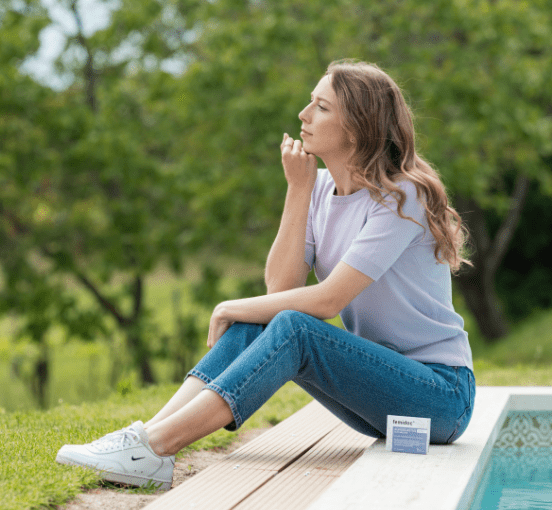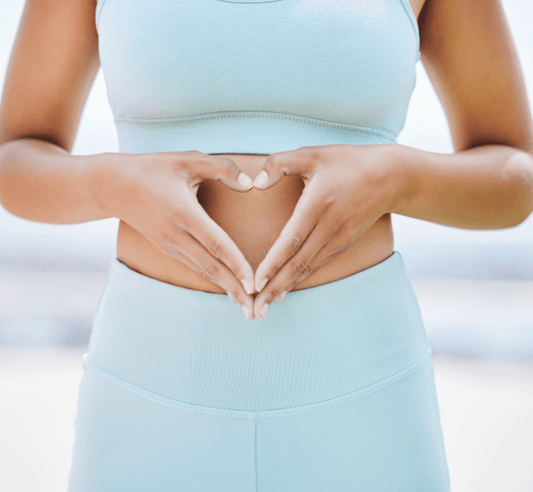Table of contents
Why periods cause problems
What is PMS?

Apr 25, 2025
Premenstrual syndrome (PMS) is a complex interplay of hormonal, neurological, and physiological factors. Although the exact mechanisms are not yet fully understood, gynecologists worldwide agree that hormonal fluctuations play a major role. Those affected can alleviate their symptoms through lifestyle changes such as a balanced diet, exercise, stress reduction, and support from nature's pharmacy.
The female cycle, which is hormonally controlled, revolves around conception, fertilization, and reproduction. First, an egg matures, followed by ovulation, the luteal phase, and menstruation, if no fertilization has occurred. Month after month, starting at an average age of 12, approximately 500 times in a woman's life.
The menstrual cycle and the role of hormones
The menstrual cycle lasts an average of 28 days and is divided into four phases:
- Menstrual phase (days 1–5): The uterine lining is shed if fertilization has not occurred.
- Follicular phase (days 6–14): Under the influence of the hormone FSH (follicle-stimulating hormone), eggs mature in the ovaries. Estrogen levels rise, preparing the uterus for possible implantation.
- Ovulation phase (around day 14): Ovulation occurs, triggered by a sudden increase in luteinizing hormone (LH).
- Luteal phase (days 15–28): After ovulation, the corpus luteum forms from the egg membrane, which produces progesterone. If fertilization fails, progesterone levels drop, which can trigger PMS symptoms.
Why does PMS occur?
For almost 70 percent of all women in Austria, menstruation begins with moderate to severe pain, accompanied by depressive moods. This is caused by hormonal changes in the female cycle. After ovulation (in the luteal phase), estrogen and progesterone levels initially rise and then decline again if fertilization has not occurred. This affects the production of the neurotransmitter serotonin, which is responsible for regulating mood, sleep, and appetite. A serotonin deficiency can cause mood swings, sleep disturbances, and food cravings.
The shedding of the remaining uterine lining is also controlled hormonally (by prostaglandins) and is often associated with pain caused by uterine contractions. Nicotine, alcohol, lack of exercise, an unbalanced diet, and stress can exacerbate symptoms during premenstrual syndrome.
The hormonal changes affect various body functions and lead to typical symptoms such as:
Physical symptoms of PMS
- Abdominal cramps
- Water retention (heavy legs)
- back pain
- Weight gain
- Breast tension
- Headaches, depending on the disposition also migraine attacks
- Impure skin (inflammation and pimples)
Psychological symptoms of PMS
- Irritability and even aggressiveness
- Nervousness to hysteria
- Inexplicable crying, sadness
- Depressive moods
- Sleep disorders
- Anxiety
Behavioral changes
- Depending on the type: cravings, often for sweets or salty foods or loss of appetite
- Reduced performance
- Lack of motivation
*Menstrual Health Report of the Federal Ministry of Social Affairs, Health and Care 2024
* Sources:
- 1 Gynaecologists on the Net (Professional Association of Gynaecologists): www.frauenaerzte-im-netz.de → Section “Cycle & Hormones”
- 2 AMBOSS (Medical Platform): Chapter “Gynecological Endocrinology”
- 3 Gaiswinkler, Sylvia; Wahl, Anna; Antony, Daniela; Ofner, Tonja; Delcour, Jennifer; Antosik, Jennifer; Pfabigan, Johanna; Pilwarsch, Johanna (2024): Menstrual Health Report of the Federal Ministry of Social Affairs, Health and Care 2024




